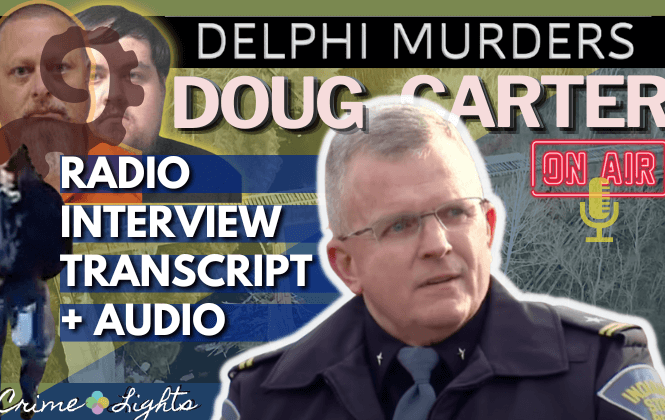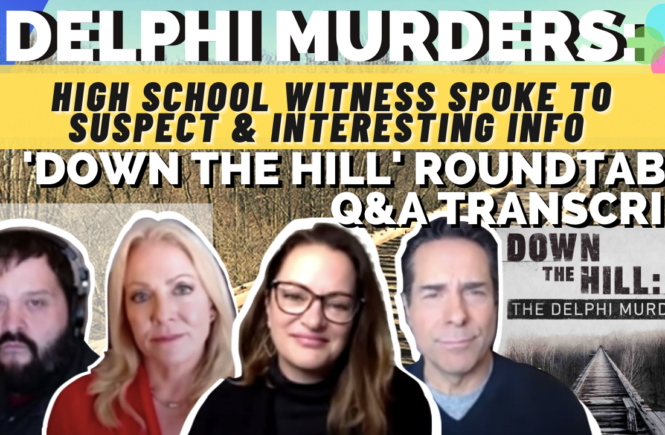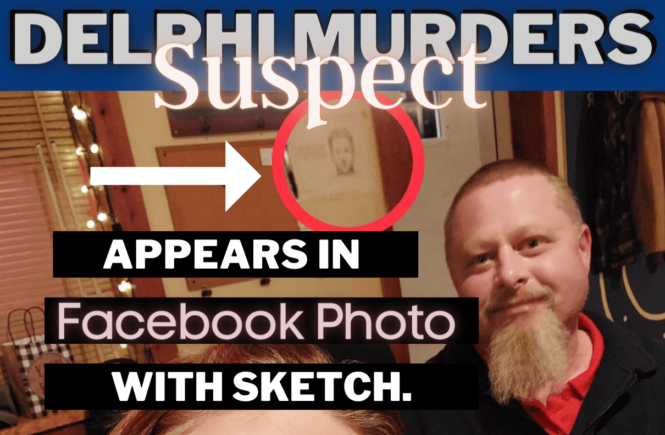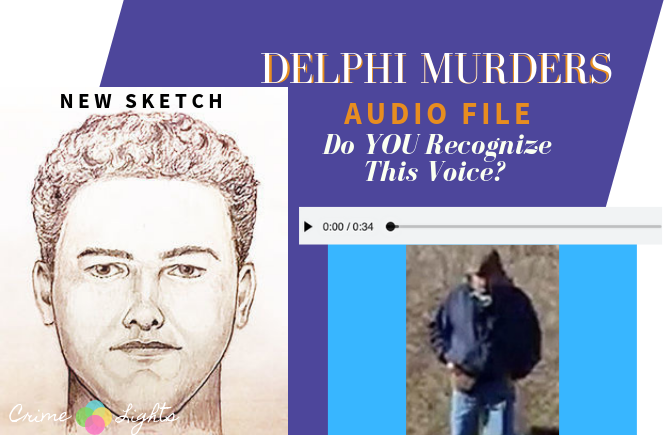“This case is unlike any that I’ve seen… there are so many different tentacles. It’s very complex.” -Doug Carter, Indiana State Police Superintendent
Topics covered include:
-the Delphi Murders
– Richard Allen arrest
–Kegan Kline connection
-Potential unsealing of the probable cause affidavit
On November 11th 2022, Doug Carter (Superintendent of the Indiana State Police & well known leader & figurehead of the Delphi Murders investigation) visited the Hammer & Nigel Show at the 93.1 WIBC studio.
The hosts conducted a great interview with the always-engaging Carter, and there seemed to be a genuine camaraderie amongst the trio that set the tone for an especially good exchange.
Below is a transcript of the show, as well as the full audio of the Doug Carter radio interview.
[ BEGIN DOUG CARTER RADIO INTERVIEW TRANSCRIPT – HAMMER & NIGEL SHOW ]
NIGEL: My name is Nigel. Jason Hammer is here. Also, special in-studio guest Indiana State Police Superintendent Doug Carter joining us back live in-studio. Good to have you here live, in-studio, Doug. Good to see you again. You look great! Pull that microphone right up towards you there, man.
DOUG CARTER: Oh, it’s my pleasure. Yeah, thank you very much for having me, it’s awesome!
NIGEL: You know, one of the things a few weeks ago after you were at the podium announcing that you’d made an arrest for Abby and Libby… I just felt like, a sense of relief. Like a [exhales dramatically, ie; ‘breathing a sigh of relief’] because this was one huge step towards finally getting some justice for Abby and Libby. I know you were quite emotional at that podium at that press conference a few weeks ago, did you feel a sense of relief? I mean, I know you’re working with several different agencies, but you’re kind of the face… you’ve been kind of the spokesperson for the investigation.
DOUG CARTER: Yeah. You know, I couldn’t wait for that day. And then when I finally got there, I wasn’t exactly sure what I was going to think or how I was going to feel. But the most important thing to me was to see how that community might heal – – begin, but most importantly of all is the family. And it was a it was a very strange, emotional day.
NIGEL: It was an intense… it was an intense press conference too because there was so many questions you couldn’t answer and the prosecutor couldn’t answer it almost— I could feel some frustration on the part of reporters in that room, because I know this investigation is still ongoing.
DOUG CARTER: I don’t blame them a bit for being frustrated. I don’t, I don’t blame them a bit. But what we have to remember, now that we’re where we are? It’s not a community interest story. It’s very factual now. And we have to be very careful. I think that’s what everybody expects. So on one hand, we say to the media, “thank you”. And I really do mean that, for keeping this front and center, not just nationally, but even globally. But then the other side is when you have questions, we can’t answer them. So I understand that frustration. I really, truly do.
HAMMER: And I know you can’t answer every question that we have here, but we’re going to fire away anyway. Is the guy in custody, Richard Allen, is he the only person being looked at in this investigation?
DOUG CARTER: Right now, he’s the one that’s now facing murder charges. So again, we are not going to stop looking at other people until this is completely done and we have nothing left to do. So 70,000+ tips. Hundreds have come in since two weeks ago… [corrects himself on date] a week ago Monday, I guess. And we’ll continue to receive those tips and look into them, as you would expect.
HAMMER: If this affidavit is released – and there’s a hearing coming up… I believe on the 22nd – that’s got some information that led to the arrest of Richard Allen, the suspect, if that is allowed to be given to the public, is that going to compromise the investigation in any way?
DOUG CARTER: No, I don’t think at this point it will. And I think it’ll answer a lot of the questions that people have. And—
HAMMER:—will we find out how we got to this point, with that information?
DOUG CARTER: You will. Yeah, it’d be much clearer.
NIGEL: What could happen? Could you give us a hypothetical of what could happen if investigators say too much too soon? If somebody – and it doesn’t have to be with this case in particular, just a hypothetical of a murder case – and somebody on the team or in the prosecutor’s office says something that they shouldn’t have. What’s the domino effect that could happen, potentially, if you reveal too much information in a case like this?
DOUG CARTER: Yeah, it’s a good… it’s a great question. And the answer is, there are things that we know that only the killer would know. And I’m speaking generally. And it’s an investigative strategy, obviously, that if we know what the killer knows and nobody else does that when we do talk to the killer, we will have a clearer idea of what occurred. And, that’s a very similar strategy that we’ve used here.
HAMMER: One of the things that I’ve heard, is why not release the cause of death? Not because people are morbidly curious, but if they knew they were looking for somebody that was either a stab or a gunshot, maybe they know somebody that sold the gun, sold the knife, maybe they could find the weapon somewhere. What’s the rationale for not releasing the official cause of death?
DOUG CARTER: Because the individual or individuals that did it, only they know what they did.
HAMMER: But do you think that’s… and I’m trying to think of the right way to say this… has that slowed down the investigation? Because I think the public, with all of their tips, has been a big help in this. Wouldn’t it make sense to have the public looking for the possible weapon?
DOUG CARTER: I don’t think at this point it would. And again, functionally, I understand the question Hammer, I really do understand it. And we’re going to look back on this and and probably realize ‘Dang it! I wish we’d have done A, B, and C rather than D and E. But, now’s not the time for us to change that strategy and talk about everything that we know.
NIGEL: What did you think when… like, a lot of news has happened with this story since you made the announcement of the arrest. Richard Allen has been moved to a state facility, the Carroll County Judge has recused himself. Did that concern you at all? That the judge in this case after five years of, you know, having been being prepared for this day, all of a sudden is now saying “… well, we don’t have enough resources to facilitate this. I’m stepping down and we’re gonna move it somewhere else.”
DOUG CARTER: You know Nigel… yeah, it did. It doesn’t anymore. It was… again, that day was very unusual for all of us: the family, the community, the country, the world. Period. It was very unusual. And then the reality struck of where we were. And I think that struck judge at the same time. And I appreciate him having the ability and the courage to step up and step out and say, “You know what, this is too big for me. I didn’t know what was going to happen, but here’s what’s currently happening. Here’s the influx. And with a small number of people in a very rural county, it’s not something that we can perpetuate and manage.”
HAMMER: Another piece of information that came out since the arrest – and this was just the last couple of days – is that maybe this guy Richard Allen has been on the radar for a long time. Did he speak to investigators? Did he speak to police in the early stages of this investigation?
DOUG CARTER: That will all come out in due time. I’m not gonna talk about Richard Allen today.
NIGEL: Yeah. There is a story on WISH-TV, our news-gathering partners, about some police ‘sources’ and some information. Did you see that yesterday?
DOUG CARTER: I did. I did.
NIGEL: You know, the search of the Wabash River they’re saying, ‘sources’ [are saying it is] linked to the Delphi investigation. Like Hammer said about, you know, Richard Allen, how long he’s been on the radar. When you see a story like this, is it… I don’t want to put words in your mouth, but is it frustrating? Especially when you see a police source confirmed this–
HAMMER: –That’s a leak from within, right?
DOUG CARTER: It is frustrating. I will say yes, it is absolutely frustrating, because we can’t talk about what we think, and I’ve said this many times before. You should expect us to only talk about what we know. And that even changes more-so once there’s a probable cause affidavit signed by a judge for the arrest of an individual… not just Richard Allen, but in any criminal case, especially a complex criminal case. This case is unlike any that I’ve seen in almost a 40 year career. So, there are so many different tentacles to this. It’s very… it’s very complex. And you know, shame on us for saying something might jeopardize that. So whoever this, quote, “source” is, I doubt very seriously that individual is a part of the core team.
NIGEL: Wow… wow.
HAMMER: The other name that’s involved in this whole story is Kegan Kline. Now, he has not been charged with anything in regards to the murders of these beautiful young ladies in Delphi. But, we know that he’s locked up for child porn. We know that he had some sort of communication with one of the ladies the day before they passed away. Has he been speaking to police? Has he been given some sort of plea deal to help police?
DOUG CARTER: We’ll continue to work… work on Kegan Kline, and whatever his connectivity might be to Abby and Libby and… almost 2100 days ago. So we will continue to work towards that.
NIGEL: It’s hard to believe it’s been that long.
DOUG CARTER: 2086 days last Monday.
NIGEL: Wow.
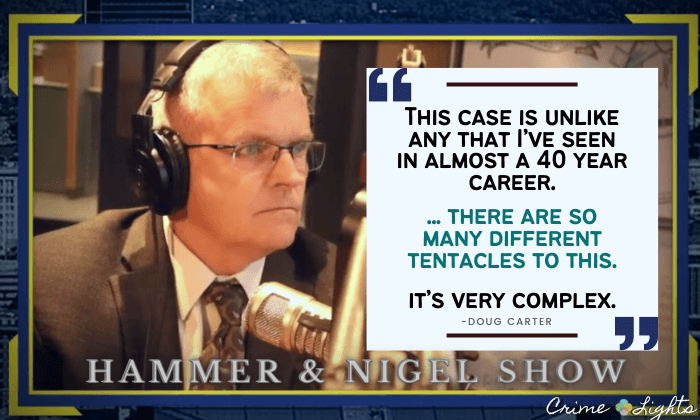
[Interview breaks for station identification bumper. Instrumental music from Metallica’s ‘Sad But True’ plays as announcer says “You’re listening to The Hammer and Nigel Show on 93-WIBC.”]
HAMMER: It’s the Hammer and Nigel Show. I’m Jason Hammer, big ‘Nige is here.
NIGEL: Hello!
HAMMER: Indiana State Police Superintendent Doug Carter is here. One more thing on the Delphi story before we move on to something else: I have been pretty critical of some of these press conferences. You touched on it earlier. You understand why the press would be a little upset. My beef with a lot of these early on was that it felt like these things were happening just for the sake of happening. There was no new information. And, the reason I felt that way… I was trying to think if I was the parent of one of these young ladies, I feel like I would be getting my hopes up. Every time one of these press conferences would happen, but then they would happen, and there’s no new information. And then it would feel like sometimes there’d be some theatrics, like some cliches being thrown out there, which again, felt like it was getting the hopes up of these families. Does that make sense to you?
DOUG CARTER: Um… yes, I can see your perspective. But that wasn’t the case. There was one press conference I can remember specifically that that Mike and Becky were not aware of. And I regret that. Again, I take responsibility here. And if there’s going to be criticism, I want it to come to me. But over time, it was important that we kept talking about this. And Hammer, had we not done that, we wouldn’t have been able to say to the media “thank you for keeping it front and center”.
NIGEL: And asking for tips… and asking for tips and the hotline—
DOUG CARTER: –Tips, information, you know we… everybody expects everything to be solved through science today, and that’s just always not the case. It’s a combination of all events. So, the human impact has been really, really fascinating to watch. And again, we didn’t have a playbook here. And we did the very best we could for over five and a half years. And again, we look back on some of the events and strategies… I’ll look forward to debating those as time goes on.
HAMMER: What do you think the biggest mistake has been? Can you talk about that? Like, I know there’s the ongoing investigation, but a couple of times today you’ve said you know “we’re ‘gonna learn from this, we’ve made mistakes.” Give me an example.
NIGEL: Was the sketch? The two sketches?
DOUG CARTER: No, I don’t think that was a mistake at all. That was, frankly, a pretty effective strategy that kept information coming our way.
HAMMER: –‘Cause the second one looked nothing like this guy that’s into custody. The first one, you can put a side-by-side up with Richard Allen and you can say “I see that!” The second one looked nothing like that guy.
DOUG CARTER: Yeah. Isn’t that somethin’?
HAMMER: But was that the right thing to put that out? ‘Cause clearly it doesn’t look like him!
DOUG CARTER: Well, again, remember that a sketch is not a photograph. It’s a sketch based on human recollection. So, I was convinced that eventually we were going to put those together and we were going to be able to take them apart, and there is going to be the individual.*
[*Note: Supt. Carter is referring to a belief he shared multiple times in the past, that when the the killer was eventually caught, his appearance would favor a combination of both sketches merged together.]
So, you know, we’re human beings. We’re expected to be superhuman. We’re not. And, we do the best we can every single day, and that’s what we’ll continue to do.
HAMMER: When someone says “I think Superintendent Carter just loves to see himself on television”, what’s your response?
DOUG CARTER: Aww, that’s crazy. No, I’m aging like an old farm dog. That’s not the case at all. You know, what I’m trying to do is keep the community and areas around the state aware of what we’re doing as much as we possibly can, because this isn’t okay.
NIGEL: It was really— we’ll pivot here. Just a few minutes left here with Superintendent Doug Carter from the Indiana State Police. Really good seeing you at the Central Indiana Police Foundation Charity last Thursday, ‘Breakfast with a Cop’, raising money for that incredible foundation. And I just wonder if we could take a few minutes to speak about what we saw there? Hammer and I were sitting with Officer Tommy Mangan, amazing guy. We were sitting with the family of fallen officer Noah Shahnavaz. And the speaker Jerry Baker, you know, retired police officer, his son dying in the line of duty. Just you know… an incredible event, hundreds of thousands of dollars raised. Just talk a little bit about that.
DOUG CARTER: Well you know, Matt and Laurie Shahnavaz – they were sitting with you at the table – I’ve really developed an amazing relationship with them and they’re just so inspirational. Tommy and his wife, I had not met them. That was a really cool moment in time.
HAMMER: He looks great!
DOUG CARTER: Oh my gosh! Doesn’t he ever?
NIGEL: He’s handsome guy! Taller than I thought, too.
DOUG CARTER: Stands right up and he’s just completely engaging. And his wife was just a beautiful, beautiful person. Hearing Jerry Baker’s story… I remember that night, I remember.
NIGEL: Longest law enforcement shootout in Indiana history.
DOUG CARTER: It was unbelievable to hear the perception from a dad that literally watched his son die ,and just… you could hear a pin drop in that room with 600 people. It was a fantastic morning and for the community to support us the way they do? I just hope you hear us say thanks all the time. It was really neat to see you guys there and participating in that event. I know you do that a lot around around Central Indiana.
NIGEL: We were honored to be guests. We were just honored to be there.
HAMMER: Yes, law enforcement is something that’s near and dear to both ‘Nige and I. We have family members that do that for a living and it’s really important to us. We were talking off camera here, off air rather. Are you seeing the same level of crime statewide as we’re seeing here in Indianapolis?
DOUG CARTER: Yeah, and you know… the answer is yes, we are. It’s a per capita analysis based on the number of people that live in a certain area, but the perception of not feeling safe is oftentimes worse than the reality of it. And, I think that you find that all over Indiana that people are not feeling as safe as they once did. And again, I think, well… I should take responsibility for that – and I try to, but that’s just the truth.
NIGEL: Are you finding a lot of drugs? Situations with drugs, fentanyl?
DOUG CARTER: Oh, absolutely.
NIGEL: You hear about them coming through the border, that porous border. Are you finding a lot of overdoses and things like that? And drug busts and things?
DOUG CARTER: Oh, we haven’t even scratched the surface of it yet, it just continues. I just got a briefing here recently from our laboratory. The amount of fentanyl that they’re dealing with—
HAMMER: —is it worse than the news makes it even out to be? Because you hear a lot about it on the news, but you guys are out there every single day. How bad is it?
DOUG CARTER: Unless you see it, you don’t understand it. It’s the worst thing we’ve seen in generations. And now with the different pill presses and the colors and the Skittle-like… it’s going to continue to exponentially increase over time, and we’ve got a lot of work to do.
HAMMER: So in terms of recruitment, we know this is a big problem with local police. IMPD, they’re in a big recruitment drive right now, but they’re short on numbers. How is it at the state level?
DOUG CARTER: It’s the same, and I want to give a shout out to IMPD for the work that they do in the city of Indianapolis. I’m proud to stand with them. In regards to recruiting statewide, we have 10 people in our current recruit school. Normally, we have 45 or 50, sometimes 65 or 70. So, we’re significantly down. We’re not going to blame somebody else for that, we’re trying to take some responsibility and re-tool—
NIGEL: What can be done?
DOUG CARTER: –how do we recruit, how do we maintain and keep people throughout the course of a career? And I hope that that starts to climb out this, because the vast majority of people are good and support us.
HAMMER: I watch a lot of these ‘On Patrol’ type shows, right? Like ‘On Patrol: Live’. I know the Beech Grove Police are a part of it this year, and I’ve got a lot of friends on the Beech Grove force. The one thing that I see more than anything else, is that everybody wants to get mouthy with the police officer. It could be the easiest traffic stop, pull over, rolling stop… everybody wants to argue and fight and bitch and complain to an officer.
DOUG CARTER: You know, that all changed with with cameras… and I wasn’t a big supporter of cameras, but I was wrong. I was flat out wrong. The cameras have helped us a lot. Oh, it’s been a fascinating experience now that we’ve got them deployed and have 700,000 pieces of video, of evidence. But you’re right. The lack of that respect is very tenable, and everybody feels it.
HAMMER: Well, thank you so much for coming in.
NIGEL: Yeah, thanks Doug!
HAMMER: Thank you for talking about the Delphi situation, the press conferences, what’s been right, what’s been wrong and… where do we go from here?
NIGEL: Do you think that November 22*, we’re ‘gonna see the unsealed affidavit?
[*Date of court hearing re: motion to unseal]
DOUG CARTER: I sense something’s going to be coming there. I don’t know, I’ve not talked to them. But yes, I sense that might be coming around… and by the way next time you have me on, I want to talk about guns.
HAMMER: Yes! Yes, we’ll do that. I know you and our pal Guy Relford had a little disagreement on Constitutional Carry…
DOUG CARTER: –But since that time, we’ve talked and we’ve met and…
NIGEL: Yeah, you guys are still friends.
DOUG CARTER: Yeah, he’s going to help us, he’ll help us. And I appreciate the points that you guys bring to it as well.
NIGEL: Absolutely.
DOUG CARTER: Just because we disagree doesn’t mean we ‘gotta hate each other. So it’s all good.
NIGEL: God Bless ‘ya!
HAMMER: Wow, you mean we can be adults about stuff?
DOUG CARTER: How ‘bout that?!
HAMMER: What the hell?!
DOUG CARTER: [Playfully] Well, you guys aren’t real good at that…
HAMMER & NIGEL: [Laughing]
NIGEL: I saw him in the hallway earlier, Doug goes “ We’re not gonna talk about Harvey Weinstein, are we?” [Laughs] It’s like no, no, no, no.
HAMMER: Thank you so much for taking the time coming in.
DOUG CARTER: It’s a pleasure, guys. Thanks!
HAMMER: [Ending Bumper] It’s the Hammer and Nigel Show.
[ END DOUG CARTER RADIO INTERVIEW TRANSCRIPT – HAMMER & NIGEL SHOW ]

